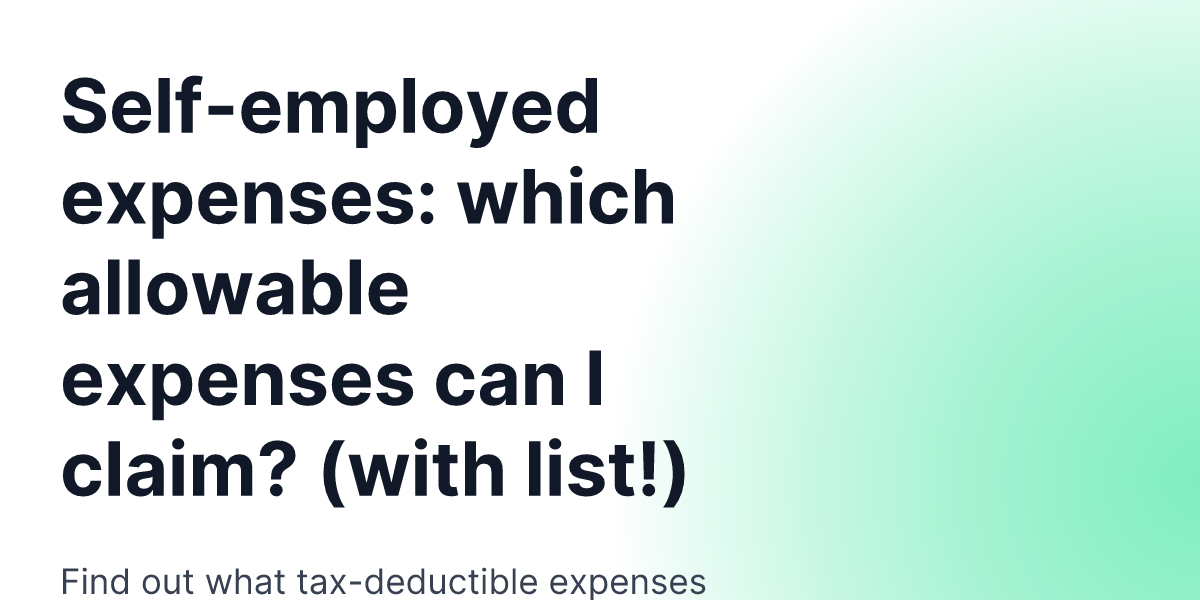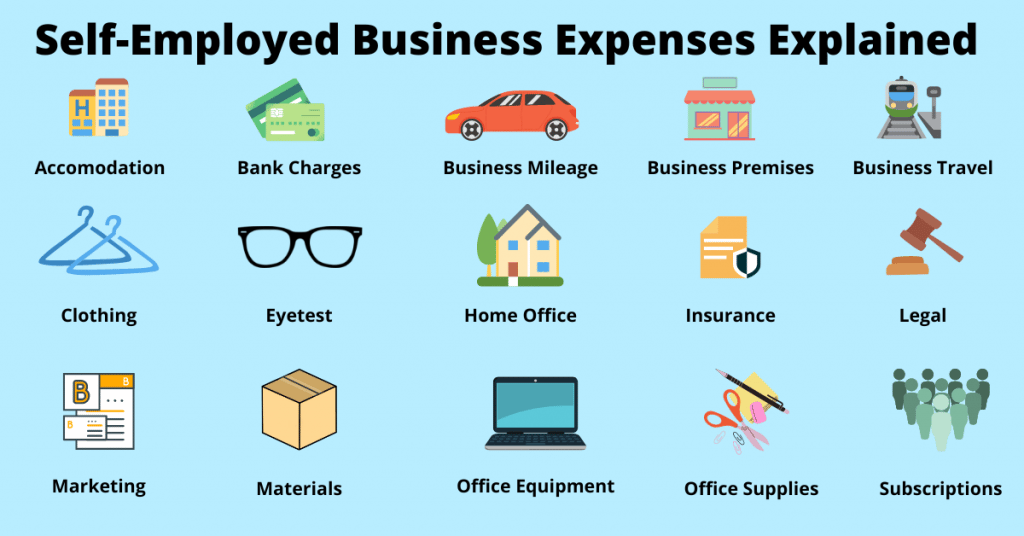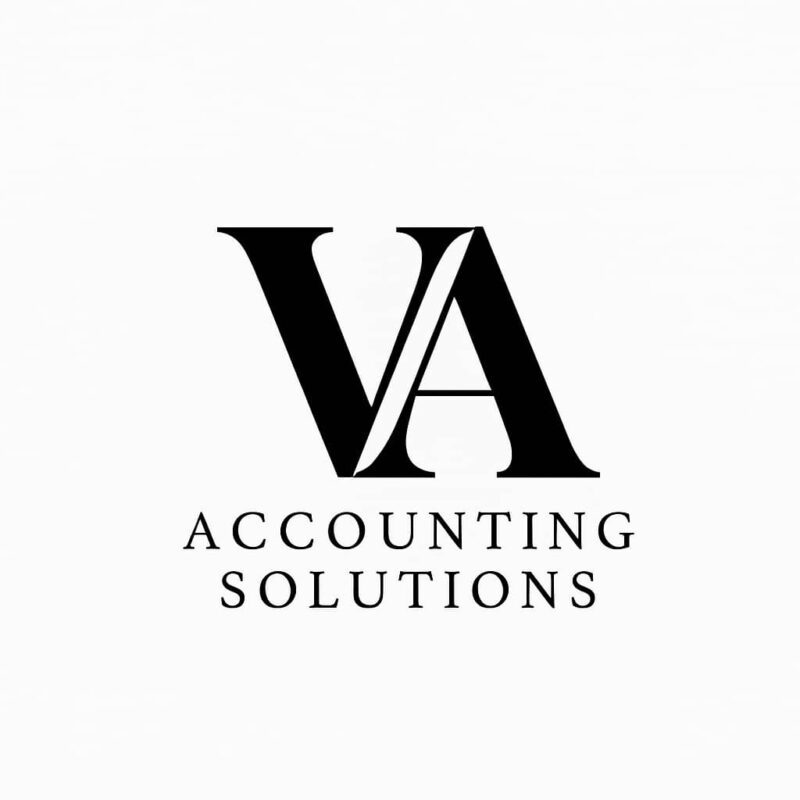No one wants to pay more tax than they need to. However, this is exactly what will happen if you fail to take account self employed allowable expenses in calculating your taxable profit. It is important, therefore, that as a self employed sole trader, you keep accurate records of the expenses that you incur in running your business, and you also understand what can be deducted and what cannot.

The General Rule
The basic rule is that a deduction is allowed for expenses incurred wholly and exclusively for the purpose of the trade. This means that as long as an expense is incurred for the purposes of the business and only for that purpose, a deduction is given.
Unlike the rule governing the deductibility of employment expenses, there is no requirement for it to be necessary to incur the expense for it to be deductible.
Self Employed: No Deduction for Private Expenses
Not surprisingly, you can only deduct business expenses when calculating your taxable profit- a deduction for private expenses is not permitted. To ensure that you can tell whether an expense is a business or a private expense, it is advisable to have a separate business credit card and use these for all business expenses. The business bank account and credit card should not be used for private expenses.
When preparing your accounts, it is important to check that no private expenditure slips through the net- it is very easy to mix the two (e.g. picking up a magazine at the same time as buying some office stationery and paying for everything together with the business debit card). Here, a deduction is only allowed for the stationery; care should be taken to exclude the cost of the magazine. Any temptation to put private items ‘through the business’ should be avoided.
Mixed Expenditure
Sometimes, expenses will be incurred for both business and private purposes. The fact that a deduction is not permitted for private expenditure does not preclude a deduction for the business portion, as long as it is possible to identify the different elements.
The Legislation provides:
‘If an expense is incurred for more than one purpose, this section does not prohibit a deduction for any identifiable part or identifiable portion of the expense which is incurred wholly and exclusively for the purposes of the trade.’
Where an expense is incurred for both private and business purposes, the extent to which any deduction is permitted depends on whether it is possible to identify the business portion.
Expenses that have a business and private element should be apportioned and a deduction claimed for the business portion. The apportionment should be done on a just and reasonable basis.
This situation may arise if a mobile phone is used for both business and personal calls. From an itemized bill, it will be possible to determine which calls are business calls and which calls are private calls and to split the cost accordingly. For example, if the annual bill is £800 and 72% of the calls are business calls, a deduction of £576 (72% of £800) would be permitted.
As a sole trader, you may have one car which you use for both business journeys and privately. Here it is easier to keep a self employed record of business mileage and to claim a deduction using the mileage rates under the simplified expenses system rather than trying to identify and apportion actual costs. Under, this system, a deduction is allowed at the rate of 45 pence per mile for the first 10,000 business miles in the tax year, and at the rate of 25 pence per mile for subsequent business miles.
Dual Purpose Expenditure for Self Employed
There is the difference between expenses with both a business and a private element, which can be separately identified, and the expenses which have a dual purpose and in respect of which a split is not possible. An example of this is the ordinary everyday clothing which is worn only for work. Despite the fact that the clothes are only worn for work, they also fulfil the private purpose of providing warmth and decency. As it is not possible to make an apportionment, no deduction is permitted in respect of the cost of the clothes.
However, as far as clothing is considered, this rule can be overcome by having a uniform which features the business name or logo, as this is an allowable expense. The key here is the logo of business name. The cost of a plain sweatshirt worn only for work is not deductible; however, the cost of a similar sweatshirt featuring the business logo is.
There are numerous examples where a claim for deductibility may fail as a result of duality of purpose, and it is important to consider this when assessing whether an expense is deductible. For example, if you need reading glasses to read work emails and to do your accounts and other paperwork, but you also use them to read the Sunday newspaper or a novel, the cost of the glasses cannot be deducted as a business expense as there is a duality of purpose. However, if a separate pair of glasses were purchased and used solely for business activities, a deduction will be permitted as there is no duality of purpose. It may pay to think ahead.
Incidental Private Benefit
In some cases, there may be an incidental private benefit to what is essentially a business expense, and where this is not significant, its existence will not prevent the expense from being deductible.
Trading Allowance
If your total trading income from self-employment is less than the £1,000 trading allowance, you do not need to report to HMRC. In this situation, you do not need to work out your profits or deduct expenses as there is nothing to report and no tax to pay. Any profit you make is tax-free.
If your trading income is more than £1,000, you can still benefit from the trading allowance. Rather than claiming a deduction for your actual expenses, you can instead opt to deduct the £1,000 trading allowance instead. This will be advantageous if your actual self assessment expenses are less than £1,000 as it will reduce your taxable profit. It is also less time-consuming.
Simplified Expenses
Using simplified expenses will save work. As noted above, simplified expenses can be used to claim a deduction for vehicle expenses by reference to a mileage rate for business mileage.
Where the business is run from home, simplified expenses can be used to determine the deduction for the business use of the home. The deduction is at a flat rate depending on how many hours the home is used each month for the purpose of the business. This is far less work than apportioning household bills between private and business use.
If you live in your business premises, as may be the case if you run a bed and breakfast establishment, you can also use simplified expenses to determine the disallowance for private use.
Typical Self Employed Allowable Expenses

As a self employed sole trader, you might incur some or all of the following expenses, which can be deducted in calculating its taxable profit, as long as the costs are incurred wholly and exclusively for the purposes of the business:
Office costs, such as stationery and printing costs and phone bills.
Travel costs, such as fuel, train, taxi and bus fares, or parking.
Uniforms bearing the business’ logo or name (but not ordinary everyday clothing).
Goods purchased for resale.
Raw materials.
Costs related to the business premises, such as rent, light and heat.
Insurance
Advertising or marketing costs.
Practical Tip for Self employed
Whether you’ve just decided to set up a self employed business or have been working for yourself for years, keeping clear, timely, and accurate self employed record keeping is vital. This ensures that you don’t miss out on deductions and stay compliant with HMRC rules.
Frequently Asked Questions (FAQs)
1. What are allowable business expenses for self-employed individuals?
Allowable business expenses are costs incurred wholly and exclusively for the purpose of running your business. These can be deducted from your income to reduce your taxable profit.
2. Can I claim expenses that are partly personal and partly business-related?
Yes, but only the business portion can be deducted. You must apportion the cost based on a just and reasonable method and keep records to support the claim.
3. What is the difference between mixed-use and dual-purpose expenses?
- Mixed-use expenses have clearly identifiable business and personal components (e.g., mobile phone bills) and can be partially claimed.
- Dual-purpose expenses serve both personal and business needs simultaneously and cannot be separated (e.g., everyday clothing worn for work), so they are not deductible.
4. Can I claim expenses for clothing used at work?
Only if the clothing is a uniform or features your business logo. Plain clothing worn for work but also suitable for everyday use is not deductible due to dual-purpose rules.
5. How do I avoid mixing personal and business expenses?
Use a separate business bank account and credit card for all business transactions. This makes it easier to track deductible expenses and avoid including personal spending by mistake.
6. What is the trading allowance and how does it work?
The trading allowance allows you to earn up to £1,000 from self-employment without paying tax or reporting to HMRC. If your income exceeds this, you can deduct the allowance instead of actual expenses if it’s more beneficial.
7. What are simplified expenses and how can they help?
Simplified expenses are flat-rate expense calculations offered by HMRC for items like vehicle costs, home office use, and living on business premises. They reduce the record-keeping burden and are easier to calculate.
8. Can I deduct the cost of reading glasses used for work?
Not usually. If the glasses are also used for personal reading, they serve a dual purpose and are not deductible. However, if you purchase a separate pair solely for business use, they may qualify.
9. Is it necessary for an expense to be ‘necessary’ in order to be deductible?
No. For self-employed individuals, the expense must be incurred wholly and exclusively for the business—but it doesn’t have to be “necessary” as it would be under employment expense rules.
10. What are some common examples of deductible expenses?
These include:
- Office supplies
- Phone and internet bills
- Business-related travel
- Advertising and marketing
- Insurance
- Rent for business premises
- Goods for resale
- Utility costs (if proportioned correctly)
